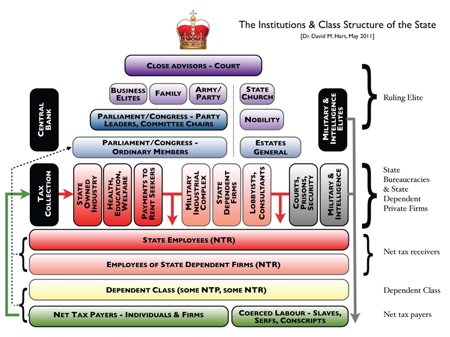
Libertarian Class Analysis: An Historical Survey
(M)en placed in society … are divided into two classes, *Ceux qui pillent,—et Ceux qui sont pillés* (those who pillage and those who are pillaged); and we must consider with some care what this division, the correctness of which has not been disputed, implies.
The first class, *Ceux qui pillent*, are the small number. They are the ruling Few. The second class, *Ceux qui sont pillés*, are the great number. They are the subject Many.James Mill, “The State of the Nation,” *The London Review,* (1835).
This monograph is a continuation of a project I have been working on for many years, most recently for example the anthology of texts I co-edited: Social Class and State Power: Exploring an Alternative Radical Tradition, ed. David M. Hart, Gary Chartier, Ross Miller Kenyon, and Roderick T. Long (Palgrave Macmillan, 2018), and a paper I gave at the Libertarian Scholars Conference on “Plunderers, Parasites, and Plutocrats: Some Reflections on the Rise and Fall and Rise and Fall of Classical Liberal Class Analysis” – paper.
My hope is to write a book on the history of classical liberal (libertarian) thinking about the nature of state power and the groups of people (“classes”) who win or lose out by having access to this power.
The approach I have taken is to show, firstly the persistence of thinking about class by proto-liberals, classical liberals (CL), radical individualists, and modern day libertarians over several centuries. I believe such thinking is a core component of the broader CL tradition which has for too long been downplayed or outright ignored.
Secondly, to let these thinkers speak in their own words I have quoted the original language alongside my own translation in most cases. This is also to demonstrate the considerable diversity of terms used to describe the class of the exploited and the exploited and what the former does to the latter. Thus I precede each section on a particular thinker with a list of the terms and language they used in their theory of class. This diversity of language is both a plus and a minus for the CL tradition – a plus because it shows the creativity of these thinkers in coming up with often hard-hitting and amusing epithets (often referring to some predatory animal!); and a minus because it meant that to a large degree these CLs did not speak with a common voice in making their case against the exploitation of one class of people by another.
The table of contents of this draft version of the monograph is the following:
Introduction: Two Competing Traditions of thinking about Class – CL and Marxist
Some Common Theoretical Aspects of Classical Liberal Class Analysis
The Central Role played by Organised Coercion
The Shared Structural Framework for CLCA
The Diversity of Terminology about Class
The Rulers vs. the Ruled
The Unproductive vs. the Productive
The Evolution of Class Society
The End of Class Rule?
The History of CLCA (I): Some Different Perspectives on Class
The View from Below
Slaves vs. Slave-owners
Tax-payers vs Tax-receivers/consumers
The “Industrious Classes”
The History of CLCA (II) – Before WW2
The Pre-history of CLCA
Étienne de La Boétie (1530–1563)
Levellers Richard Overton (1631–1664) and William Walwyn (1600–1681)
18th Century Commonwealthmen: John Trenchard (1662–1723) and Thomas Gordon (1692–1750)
The Enlightenment
Adam Smith (1723–1790)
Adam Ferguson (1723–1797)
Turgot (1727–1781)
John Millar (1735–1801)
English Radicals and Republicans
American Radicals and Republicans
The Philosophic Radicals and the Benthamites
William Cobbett (1763–1835)
John Wade (1788–1875)
Jeremey Bentham (1748–1832)
James Mill (1773–1836)
The Classical Political Economists: The English School
John Stuart Mill (1806–1873)
Richard Cobden (1804–1869)
The French Political Economists and the Paris School
Jean-Baptiste Say (1767–1832)
Benjamin Constant (1767–1830)
Charles Comte (1782–1837), Charles Dunoyer (1786–1862), and Augustin Thierry (1795–1856)
Frédéric Bastiat (1801–1850)
Ambroise Clément (1805–86)
Gustave de Molinari (1819–1912)
The Sociological School
Herbert Spencer (1820–1903)
Gustave de Molinari (1819–1912)
William Graham Sumner (1840–1910)
Vilfredo Pareto (1848–1923)
The History of CLCA (III) – The Post-WW2 Renaissance of CLCA
Ludwig von Mises, Murray N. Rothbard, and the Circle Bastiat
Post-Circle Bastiat – the Libertarian Scholars Conferences
Other Works on CLCA by CLs and Libertarians
Other Approaches similar to CLCA
Public Choice and Rent-Seeking
Rational Choice and Predatory Rulers
Mancur Olson and State Banditry
Angelo Codevilla on the Ruling Class vs. the Country Class
Marxists who are “Bringing the State Back In”
